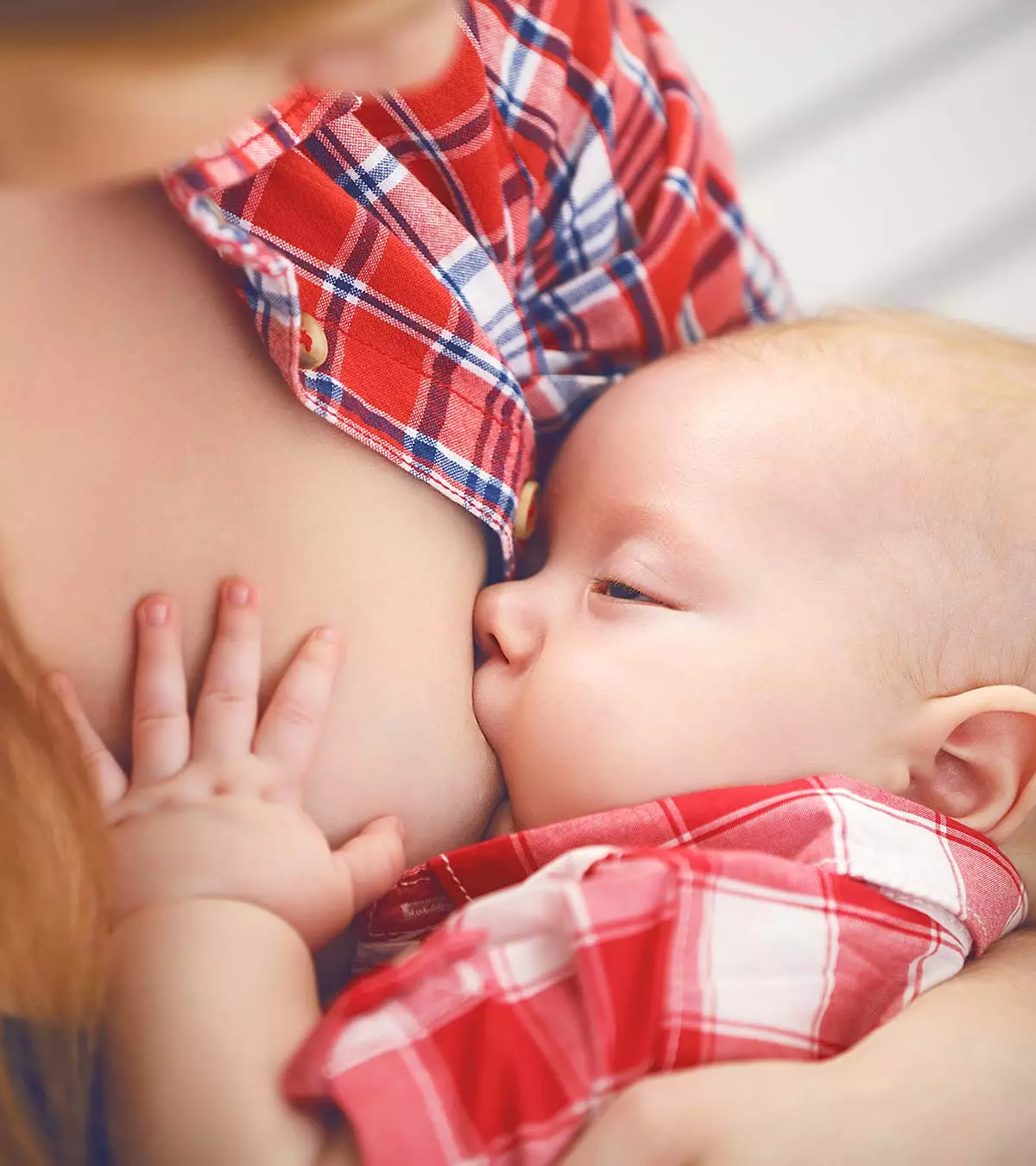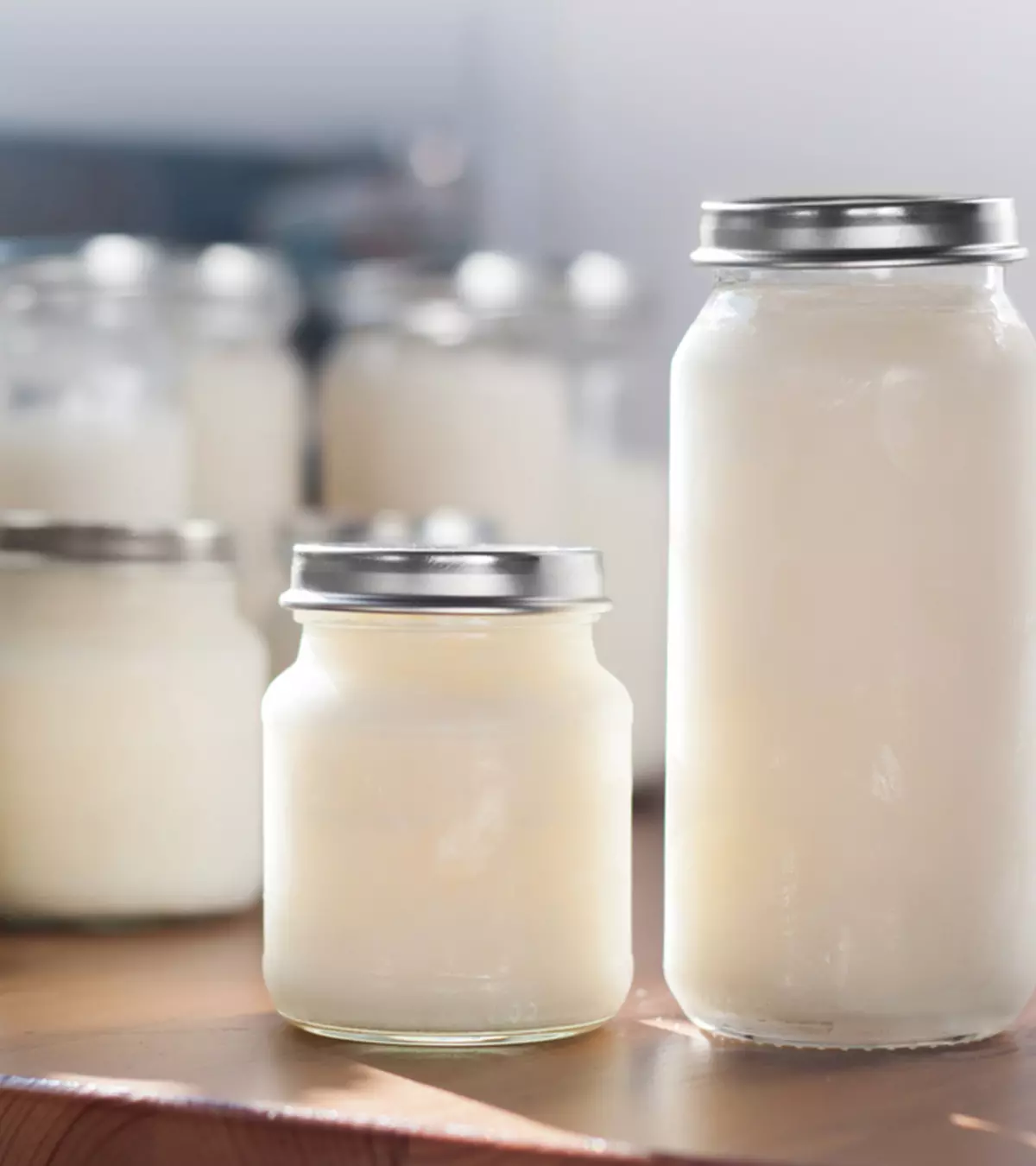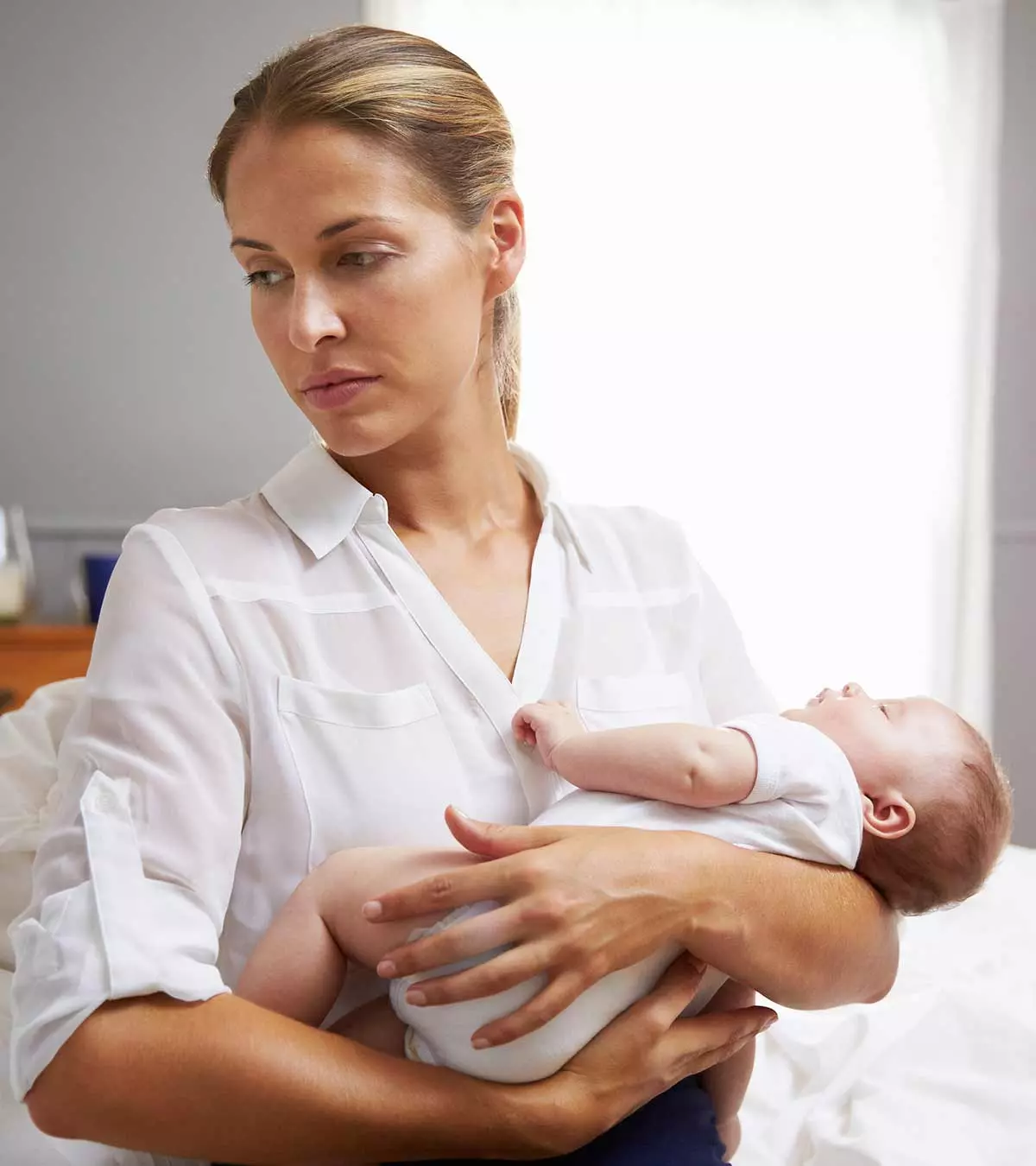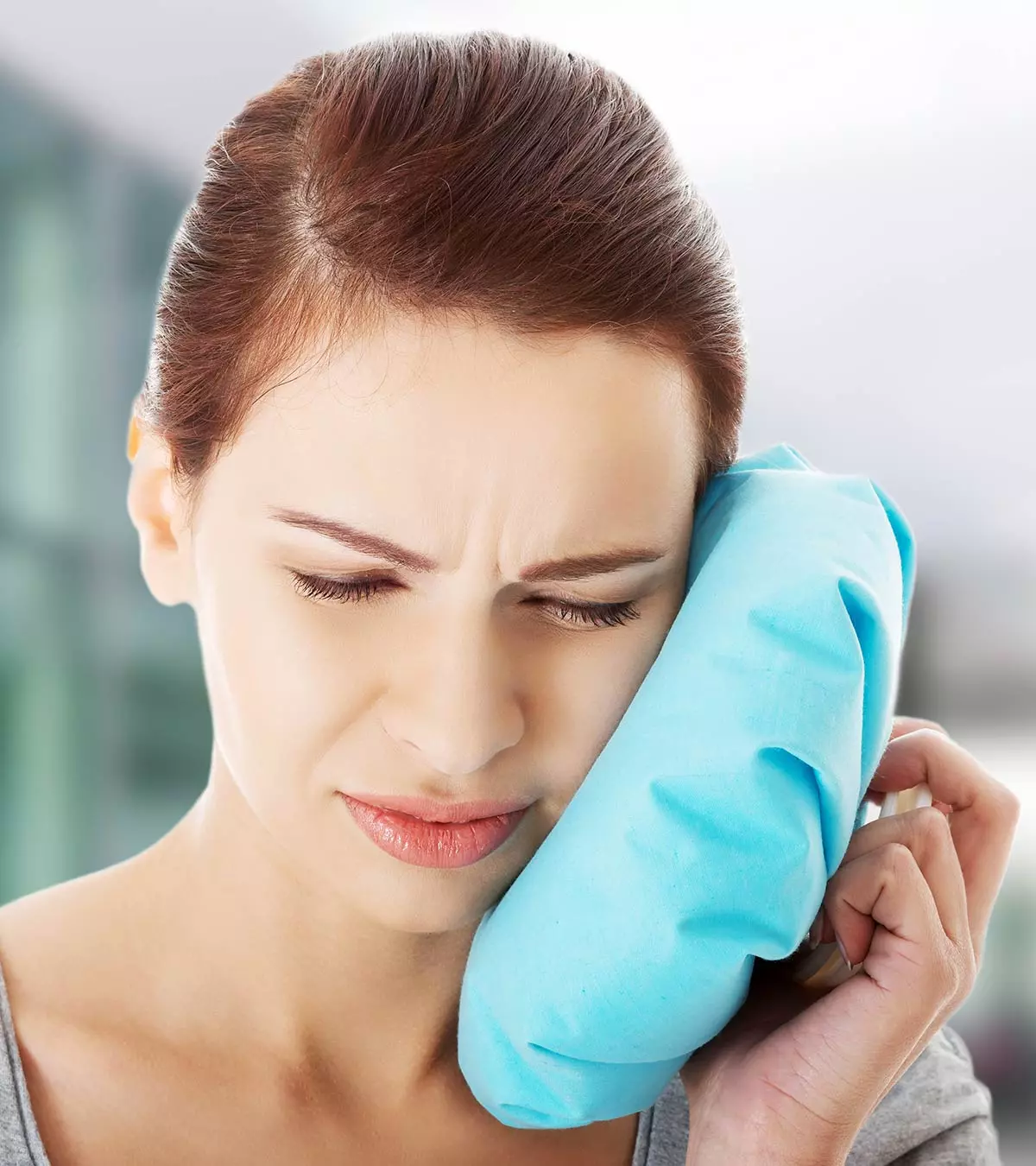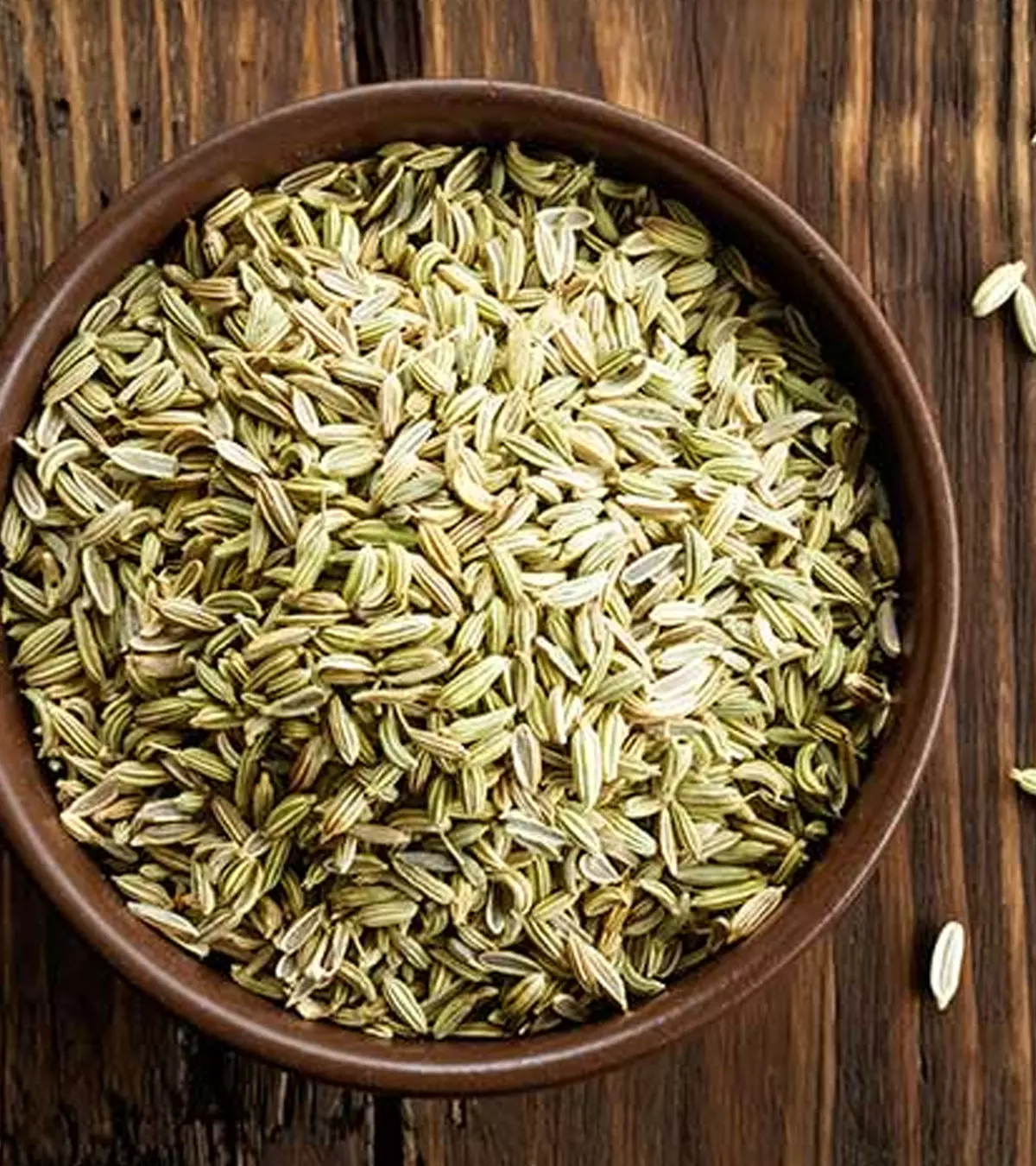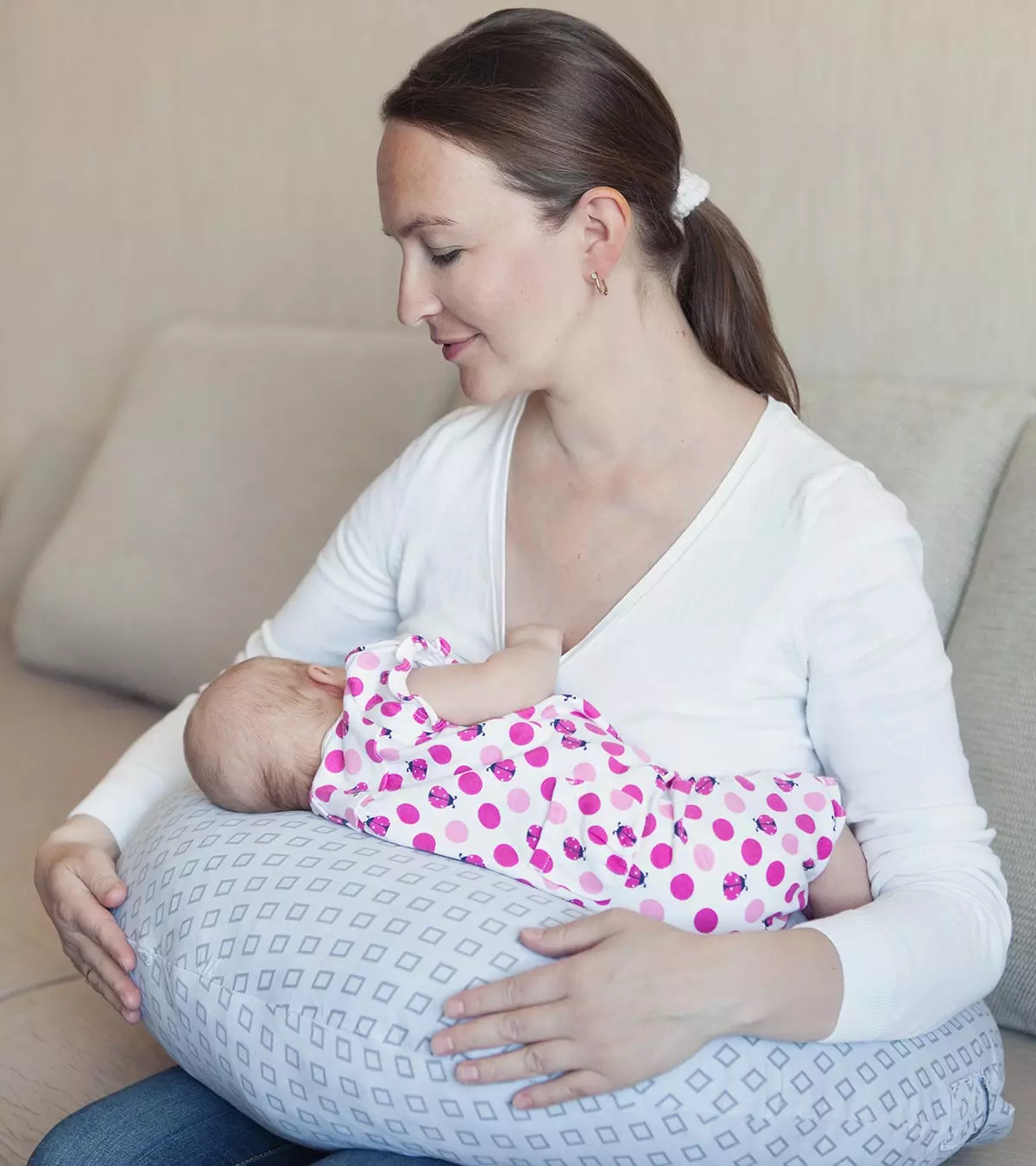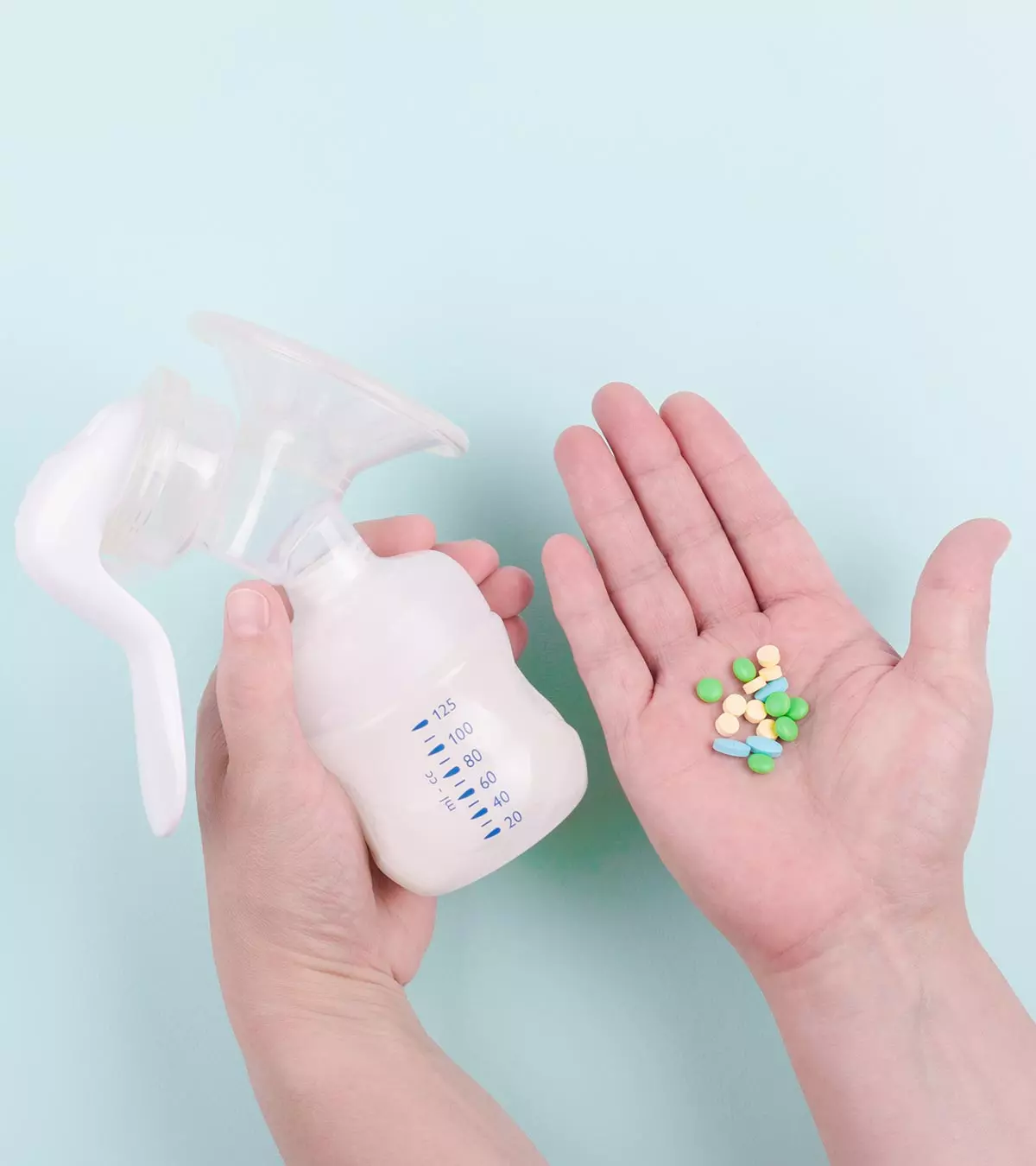
Image: iStock
Breastfeeding is like a workout for babies, and just like adults sweat when they exercise, babies sweat while breastfeeding. Sweating or perspiration is the body’s way of keeping itself cool by sending excess heat out of the body. Sweating may happen anywhere on the body, but it is most common on the head, scalp, under the arms, on palms, and the soles of feet (1). Read this post as we explain the causes, management, and signs you need to see a doctor if you notice your baby sweating more than usual when they breastfeed.

Key Pointers
- Sweating is a natural reflex of the body to cool itself and is often not a serious condition in babies while nursing.
- Reasons that might cause the baby to sweat while breastfeeding include skin-to-skin contact, hot room temperature, warm clothes, and immobility.
- It is ideal to consult a doctor if a baby’s sweating is accompanied by excessive fatigue, rapid heart rate, weight loss, or shortness of breath.
- A few preventive measures to combat sweating are removing excess clothing, keeping the room ventilated, and avoiding heavy covering while breastfeeding.
Do Babies Sweat When Feeding?
Some babies sweat while breastfeeding. If the baby’s body temperature rises due to some reason, then the sweat glandsiSmall, tubular structures on the skin that produce sweat and regulate body temperatures release sweat. Certain health conditions might also cause sweating while breastfeeding.
Not all babies sweat while breastfeeding. Read on to know more about the likely causes.
Why Do Babies Sweat While Breastfeeding?
If your baby is sweating during feeding, then it does not mean that there is always a pathological reason for that. A baby might sweat for the following general physiological reasons:
1. Skin-to-skin contact

While feeding, the baby comes in skin-to-skin contact with the mother. The heat exchange between the mother and the baby’s skin during skin-to-skin contact may sometimes cause a baby to sweat.
2. Room temperature
High room temperature can make a baby uncomfortable and overheated. It can also lead to sweating.
 Quick fact
Quick fact3. Excess covering
Parents may cover the baby in blankets to keep them warm. At times, the mother might cover herself and the baby while breastfeeding in public. Placing a cover over the baby’s stroller or car seat makes it warmer for the baby, even if the cover is thin and breathable. This can overheat the baby and may cause sweating.
4. Warm clothes

Covering the baby in warm clothes can increase body temperature and cause sweating. Making the baby wear a cap during the feeding session might cause sweating on the head.
 Quick tip
Quick tip5. Remaining in the same position
If the baby is held in the same position for a long time, then it may cause overheating and sweating on the part of the baby’s body that is in contact with your skin.
Kathy Gauthier, certified lactation consultant from Brooksville, Florida, says, “Positioning while breastfeeding also contributes to the baby becoming warm. Mothers tend to hold the baby in a cradle position when they are breastfeeding, holding the baby’s head in their palms. The warmth from her palms may cause the baby to sweat.”
Why Does The Baby’s Head Sweat While Breastfeeding?
In babies, sweat glands are concentrated on the forehead and scalp, thus leading them to sweat more in these regions. The sweat glands gradually develop on the chest, limbs, followed by other parts of the body (2).
When To Consult A Doctor?
See the doctor in the following scenarios.
- The baby gets tired too soon and does not eat enough or the baby falls asleep right after starting the feed. Consult a lactation consultant IBCLC to assess a feeding and discuss ways to stimulate the baby to actively suckle at the breast.
- They do not gain enough weight. Reach out to a lactation consultant to assess how breastfeeding is going and identify the cause for slow and/or no weight gain.

- The baby experiences shortness of breath or labored breathingiA condition characterized by difficulty in breathing and making one feel tired or worn out , or gasps for air while breathing.
- There is a blue tint on the baby’s skin, probably indicating that they have less oxygen in the circulating blood.
How To Reduce Sweating While Breastfeeding?
The following tips might help reduce sweating in a baby during breastfeeding.
- Dress the baby in loose and comfortable clothes. The baby’s clothes should be compatible and suitable for the weather or ambient temperature.
- Choose breathable cotton fabric clothes for your baby. Do not dress them in fabrics like polyesteriA kind of plastic or synthetic fiber usually derived from petroleum .
- Avoid wearing woolen or polyesteriLactation consultant clothes yourself while feeding the baby.
- Do not put layers of blankets over the baby while breastfeeding. Instead, use a soft and breathable nursing cover.
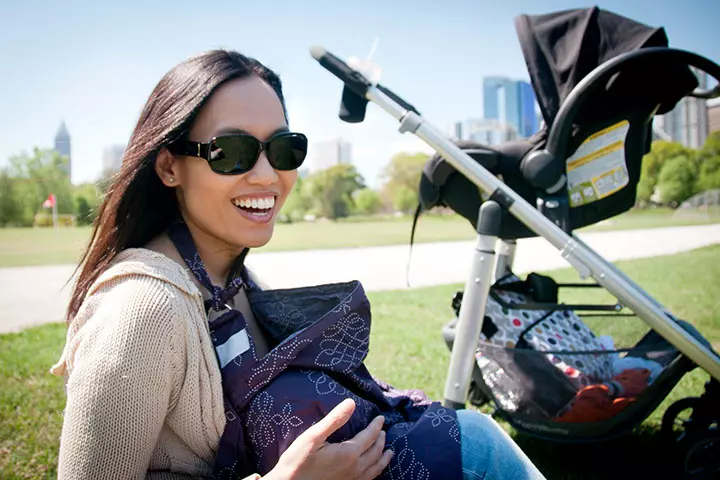
- Do not cover the baby’s head while you are breastfeeding them. Putting caps and mittens on the baby might cause excessive sweating.
- Feed the baby in a well-ventilated room. Keep the temperature of the room comfortable (3). You can use a fan or air conditioning when necessary.
 Quick tip
Quick tipIf none of the tips help in the reduction or management of sweating in babies, then see a pediatrician or a certified lactation consultant.
Does Sweating While Nursing Indicate A Health Issue?
Baby sweating while breastfeeding is not always a cause of concern, but in some cases, excess sweating might indicate an underlying condition. The following are the possible health conditions that might make your baby sweat while feeding.
1. Hyperhidrosis
Hyperhidrosis is characterized by excessive sweating in toddlers, in amounts greater than what is needed to regulate body temperature (thermoregulation) (4). The exact cause of hyperhidrosis is unknown; while it is uncommon among babies, it can still occur. A retrospective study performed by US-based researchers discovered that among 44,484 individuals who had hyperhidrosis, about 0.8 percent belonged to the age group of zero to eight.
2. Thyroid issue
Hyperthyroidism occurs when the thyroid glandiA small organ located at the front of the neck secreting hormones vital for metabolism and brain development makes too much thyroid hormone (thyroxine). Excessive thyroid hormone increases the metabolic rate, which may cause excessive sweating, along with other symptoms such as weight loss, rapid heartbeat, etc. (5)
3. Congenital heart disease
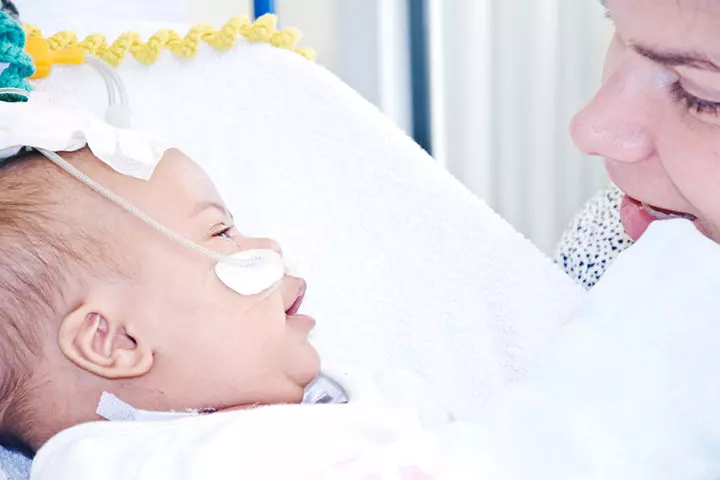
Congenital heart diseasesiThe most common type of birth defect marked by problems with the structure of the heart occur when a baby’s heart does not form properly during the fetal stageiThe period from the 11th week of pregnancy until birth in which blood cells, kidney cells, and nerve cells develop . It may cause a variety of conditions and disorders that affect heart function. Babies with congenital heart diseases display symptoms such as fatigue, chronic crying, rapid breathing, and excessive sweating (6).
Pulmonary atresia (PA) is one such form of heart disease where the pulmonary valve, which controls blood flow from the right side of the heart to the lungs, is either missing or abnormally developed. Infants suffering from this condition may have lower levels of oxygen in the blood as the blood flow to the lungs is restricted. Thus, babies with pulmonary atresia may get tired easily while feeding and may also sweat while breastfeeding. In addition to sweating, they may also exhibit other symptoms, such as cyanosis (bluish discoloration of the skin), rapid breathing, shortness of breath, pale or clammy skin, fatigue, sleepiness, and seizures (7) (8). There is no known cause of this condition, and is believed to be congenital.
Frequently Asked Questions
1. When do babies start sweating?
Most babies born after 36 weeks of gestationiThe period between conception and birth of the baby, during which the development of the fetus takes place start sweating from the first day of birth itself (9).
2. How do you tell if a newborn is overheated?
To tell if your baby is overheated, feel the back of their neck for sweat and use a thermometer to check their temperature. Watch for irritability and unusual tiredness, as these can be signs of discomfort. Also, look for hot, flushed skin as an indication of overheating (10)
3. Is it safe to breastfeed a baby sweating due to a fever?
It is important to breastfeed a baby with a fever to ensure they stay hydrated and get enough nutrition to recover from any infections they may have (11) (12).
4. Do premature babies experience more sweating during breastfeeding?
Premature babies have an underdeveloped thermoregulatory system and may begin to sweat later than term babies. However, as time passes, their sweating capabilities become normal, and they sweat like any other baby, including while breastfeeding (13).
Babies sweat while breastfeeding for various reasons, including increased body temperature due to skin-to-skin contact, warm clothes, excessive covering, warm climate, or remaining in the same position for a longer time. These conditions can be managed by changing room temperature or clothing. It is recommended to seek medical care if your baby has sweating and breathing troubles, turns blue, is not gaining weight, or becomes tired from feeding. These symptoms can indicate hyperhidrosis, thyroid issues, and cardiac issues in babies, and sweating may disappear after managing the underlying causes.
Infographic: Tips To Control Babies’ Sweating While Breastfeeding
You might often notice your little one sweating while breastfeeding, specifically in hot weather or when they are excessively covered with clothing. Nonetheless, following easy tricks can help reduce a baby’s sweating when nursing. So read on as this infographic covers helpful tips to deal with this issue. Illustration: Momjunction Design Team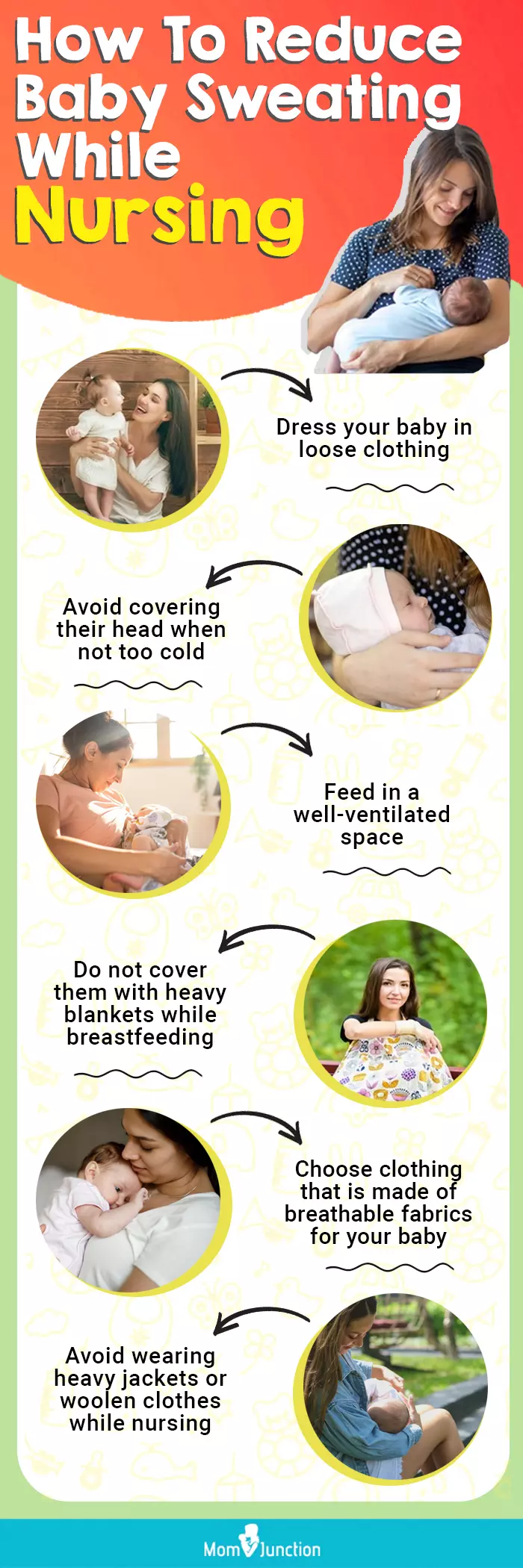
References
1. Sweating, US National Library of Medicine
2. K. G. Foster, E. N. Hey And G. Katz, The Response Of The Sweat Glands Of The New-Born Baby To Thermal Stimuli And To Intradermal Acetylcholine; The Journal of Physiology
3. The safest room temperature for babies; The Lullaby Trust
4. Hyperhidrosis; The Children’s Hospital of Philadelphia
5. Hyperthyroidism; Boston Children’s Hospital
6. Diagnosing Congenital Heart Defects in Children; Hassenfeld Children’s Hospital
7. Pulmonary atresia; Mount Sinai
8. Pulmonary atresia; Cedars Sinai
9. Sweating in preterm babies; The Journal Of Pediatrics; ScienceDirect
10. Discharge Instructions: Keeping Your Newborn Warm ; Saint Luke’s
11. Health Information Cards; Family Health Division of the Ghana Health Service
12. Key practice: Infant feeding during sickness; UNICEF
13. Harpin & Rutter; Sweating in preterm babies; NCBI
14. What’s the Best Temperature for Sleep?; Cleveland Clinic
15. Tips on Dressing Your Baby for Every Season; Penn Medicine
Community Experiences
Join the conversation and become a part of our nurturing community! Share your stories, experiences, and insights to connect with fellow parents.
Read full bio of Yinés Garcia-Taylor
- Kathy Gauthier is a Certified Nurse Midwife and International Board Certified Nurse Midwife with 40 years of experience. She is the founder of Kathy's Breastfeeding Nook, through which she provides services to women during pregnancy and breastfeeding and offers classes in prenatal care, infant massage, and concierge services.
 Kathy Gauthier is a Certified Nurse Midwife and International Board Certified Nurse Midwife with 40 years of experience. She is the founder of Kathy's Breastfeeding Nook, through which she provides services to women during pregnancy and breastfeeding and offers classes in prenatal care, infant massage, and concierge services.
Kathy Gauthier is a Certified Nurse Midwife and International Board Certified Nurse Midwife with 40 years of experience. She is the founder of Kathy's Breastfeeding Nook, through which she provides services to women during pregnancy and breastfeeding and offers classes in prenatal care, infant massage, and concierge services.
Read full bio of Dr. Ritika Shah
Read full bio of Swati Patwal
Read full bio of Ghazia Shah






